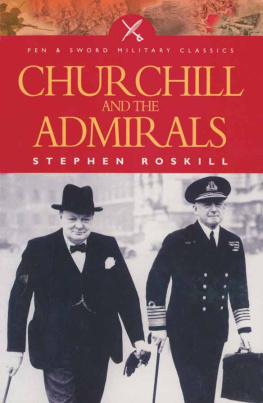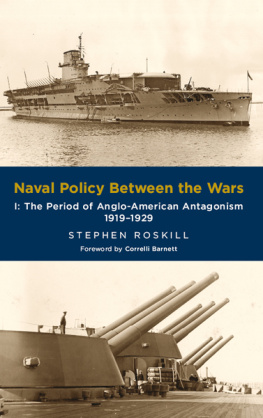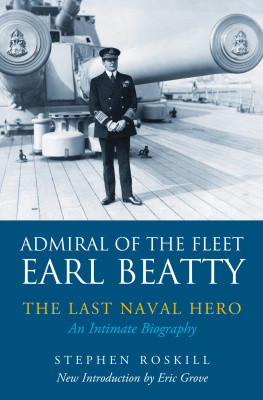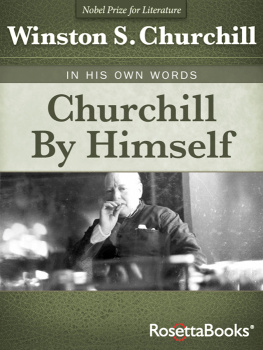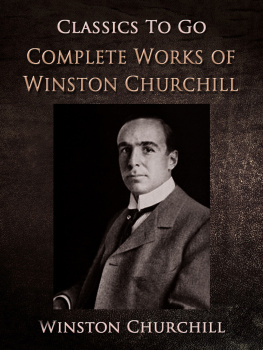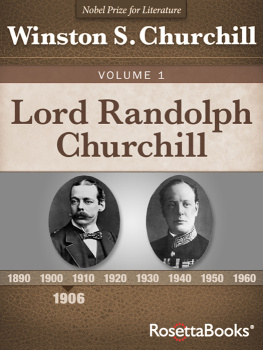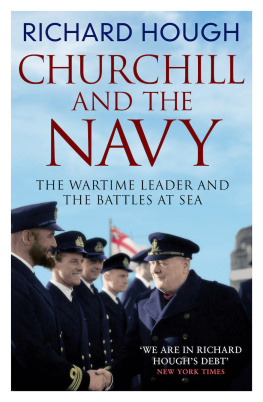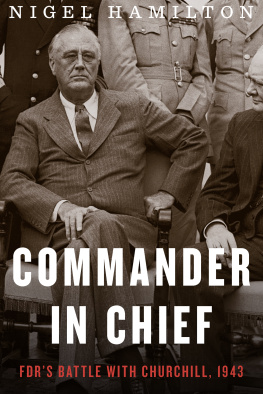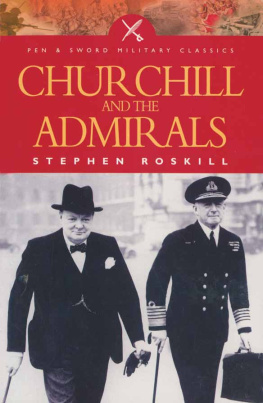Stephen Roskill - Churchill and the Admirals
Here you can read online Stephen Roskill - Churchill and the Admirals full text of the book (entire story) in english for free. Download pdf and epub, get meaning, cover and reviews about this ebook. year: 2004, publisher: Pen and Sword, genre: Non-fiction. Description of the work, (preface) as well as reviews are available. Best literature library LitArk.com created for fans of good reading and offers a wide selection of genres:
Romance novel
Science fiction
Adventure
Detective
Science
History
Home and family
Prose
Art
Politics
Computer
Non-fiction
Religion
Business
Children
Humor
Choose a favorite category and find really read worthwhile books. Enjoy immersion in the world of imagination, feel the emotions of the characters or learn something new for yourself, make an fascinating discovery.
- Book:Churchill and the Admirals
- Author:
- Publisher:Pen and Sword
- Genre:
- Year:2004
- Rating:4 / 5
- Favourites:Add to favourites
- Your mark:
- 80
- 1
- 2
- 3
- 4
- 5
Churchill and the Admirals: summary, description and annotation
We offer to read an annotation, description, summary or preface (depends on what the author of the book "Churchill and the Admirals" wrote himself). If you haven't found the necessary information about the book — write in the comments, we will try to find it.
Churchill and the Admirals — read online for free the complete book (whole text) full work
Below is the text of the book, divided by pages. System saving the place of the last page read, allows you to conveniently read the book "Churchill and the Admirals" online for free, without having to search again every time where you left off. Put a bookmark, and you can go to the page where you finished reading at any time.
Font size:
Interval:
Bookmark:
Churchill and the Admirals
by the same author
THE WAR AT SEA, 3 vols in 4 parts (HMSO)
H M.S. WARSPITE
THE SECRET CAPTURE
THE NAVY AT WAR 19391945
(White Ensign in U.S. Edition)
THE STRATEGY OF SEA POWER
A MERCHANT FLEET IN WAR 19391945
THE ART OF LEADERSHIP
Ed. DOCUMENTS RELATING TO THE NAVAL AIR SERVICE,
Vol 1, 19081918
Ed. THE BATTLE OF THE ATLANTIC by D. A. Rayner.
HANKEY: MAN OF SECRETS, Vol. I, 18771918
HANKEY: MAN OF SECRETS, Vol. II, 19191931
HANKEY: MAN OF SECRETS, Vol. III, 19311963
NAVAL POLICY BETWEEN THE WARS, Vol. I, 19191929
NAVAL POLICY BETWEEN THE WARS, Vol. II, 19301939
Churchill
and the Admirals
STEPHEN ROSKILL

First published in Great Britain in 1977 by William Collins
Published in 2004 in this format by
P E N & S W O R D M I L I T A R Y C L A S S I C S
an imprint of
Pen & Sword Books Limited
47 Church Street
Barnsley
S.Yorkshire
S70 2AS
Copyright Stephen Roskill, 1977, 2004
ISBN 1 84415 104 2
The right of Stephen Roskill to
be identified as Author of this Work has
been asserted by him in accordance with
the Copyright, Designs and Patents Act 1988.
A CIP record for this book
is available from the British Library.
All rights reserved. No part of this book may be reproduced or
transmitted in any form or by any means, electronic or mechanical
including photocopying, recording or by any information storage
and retrieval system, without permission from the Publisher in writing.
Printed and bound in Great Britain by
CPI UK
Pen & Sword Books Limited incorporates the imprints of
Pen & Sword Aviation, Pen & Sword Maritime, Pen & Sword Military,
Wharncliffe Local History, Pen & Sword Select,
Pen & Sword Military Classics and Leo Cooper
For a complete list of Pen & Sword titles please contact:
PEN & SWORD BOOKS LIMITED
47 Church Street, Barnsley, South Yorkshire, S70 2AS, England.
E-mail: enquiries@pen-and-sword.co.uk
Website: www.pen-and-sword.co.uk
This book is dedicated to the
staff of the military section
of the War Cabinet Secretariat
19391945 whose contribution to
victory was unobtrusive but vital
Contents
| Return to Power and the Norwegian Campaign: 19391940 |
| The Admirals Afloat. I. Home Waters and the Atlantic: 19391942 |
| The Admirals Afloat. II. The Mediterranean: 19401942 |
| The Months of Victory: JanuaryAugust 1945 |
In 1949 I was appointed to the Cabinet Office Historical Section to write the volumes of the United Kingdom Military History Series published as The War at Sea 19391945 (HMSO 195461) under the editorship of the late Professor Sir James Butler. Though often referred to colloquially as the official histories of World War II that description is in fact incorrect, as anyone who troubles to read the Editors Preface to my first volume can easily ascertain, since the organization and conditions under which the Military History Series was written are there clearly described.
After some months devoted to reading myself into the subject I was required to handle, and to studying the archival material available, I asked the Admiralty for access to the First Lords and First Sea Lords papers of my period. I did this as a test case regarding the guarantee of full and free access to all relevant documents promised to the authors of the Military Histories, since, largely thanks to Admiral Sir Herbert Richmond, I was fully apprised of the serious troubles Sir Julian Corbett had experienced with the Admiralty over his volumes of the Official Naval History of World War I. Although, perhaps too imaginatively, I visualized the flurry of embarrassment which my request for such closely guarded records caused among the civil servants across the Horseguards Parade, the papers were made available to me after some delay. I have here used them or the survivors from among them again, though more extensively and with greater freedom than was prudent a quarter of a century ago.
In 1949 I also got into touch with all the leading naval men of my period. Their response was without exception extremely helpful and cordial, they all agreed to read and criticize the drafts of chapters describing events in which they had taken part, or of which they had special knowledge, and they sent me a large number of valuable letters in amplification of the official records of those events. Later on some of those officers either appointed me as their literary executor, or reserved their papers and diaries for my sole use, or made Churchill College, Cambridge, of which I became a Fellow in 1961, the repository for their own collections of documents and letters. Not surprisingly a good deal of my correspondence with them dealt with the ever-fascinating subject of their relations with Winston Churchill both as First Lord of the Admiralty and as Prime Minister; and many of those officers continued to correspond with me on that subject to the day of their deaths. One end product of this correspondence, and of the prolonged thought I gave to the subject, was a series of articles published in the Sunday Telegraph in February 1962 entitled Churchill and his Admirals. (The use of the possessive pronoun was of course incorrect, as correspondents hastened to point out, since all officers held their commissions from the Monarch and not the Prime Minister, and Flag Rank was conferred by the Lords Commissioners of the Admiralty. In my typescript I had used the definite article Churchill and the Admirals, but for some reason best known to himself the Editor altered it before printing). Despite this gaffe the reception accorded by naval men to those articles was very warm, and some of them sent me supplementary material on the subject. I thus came to accumulate a considerable archive, to which I have continuously added the fruits of further correspondence and interviews.
It was actually my Publishers Editor for many years Mr Richard Ollard, to whom I owe an immense debt for historical and literary guidance, who suggested that I should expand the Sunday Telegraph articles into a book; and the work now presented to the public, not without a good deal of diffidence on my part, is the result.
It is I think essential to make clear that one of the chief sources I have used, namely the minutes, memoranda and letters which Churchill addressed to the Admiralty (generally to the First Lord and First Sea Lord), and the replies sent to him were produced in totally different ways. As to the former, though Churchill sometimes acted on advice or suggestions made to him by the members of his Secret Circle or Inner Cabinet, they nearly all bear the unmistakable and inimitable mark of his own style, and were probably dictated directly from the ever-active volcano of his mind. The replies on the other hand, though generally signed by A. V. Alexander the First Lord or, less commonly by the First Sea Lord, were in essence the considered view of the naval staff. When one of Churchills minutes, often referred to colloquially as prayers because of his custom of beginning them with a request such as Pray consider something or other, arrived in the Admiralty it would first go to the staff division or supply department chiefly concerned, and a reply would be drafted there. If it bore one of his Action This Day labels it would next be taken by hand to any other staff division concerned, where additions or amendments might be made, and then to the member of the Board of Admiralty or Superintending Lord responsible for that particular aspect of the navys administration or operations. Again amendments might be made before it was taken, again by hand, to the offices of the VCNS and First Sea Lord, from which, if they approved the draft, it would be cleared with the branch of the Secretariat concerned and then taken to the First Lords Private Office. Although in cases of extreme urgency some of the above steps might be cut out such was the practice generally followed; and it is noteworthy that the First Sea Lord and First Lord usually accepted the drafts which reached them perhaps making some minor amendments. I have found few cases where they disagreed so fundamentally that the proposed reply was sent back down the line for review and reconsideration. Thus the Admiraltys answers, though usually well expressed and clearly worded, strike quite a different note to that sounded by the Churchillian minutes they were answering, and one does not find in them the picturesque metaphor and graphic phraseology, let alone the occasional hortatory or minatory note, which characterized the latter. The difference lay of course in the fact that whereas the minutes were the product of a brilliant, if sometimes erratic, mind the answers had to represent the less distinctive but carefully considered departmental view. A similar difference will be found between the many signals and letters Churchill addressed direct to Commanders-in-Chief of the major fleets or, less frequently, to commanders of squadrons, and for the same reasons but with the Flag Officers staff acting in place of the naval staff in Whitehall.
Next pageFont size:
Interval:
Bookmark:
Similar books «Churchill and the Admirals»
Look at similar books to Churchill and the Admirals. We have selected literature similar in name and meaning in the hope of providing readers with more options to find new, interesting, not yet read works.
Discussion, reviews of the book Churchill and the Admirals and just readers' own opinions. Leave your comments, write what you think about the work, its meaning or the main characters. Specify what exactly you liked and what you didn't like, and why you think so.

